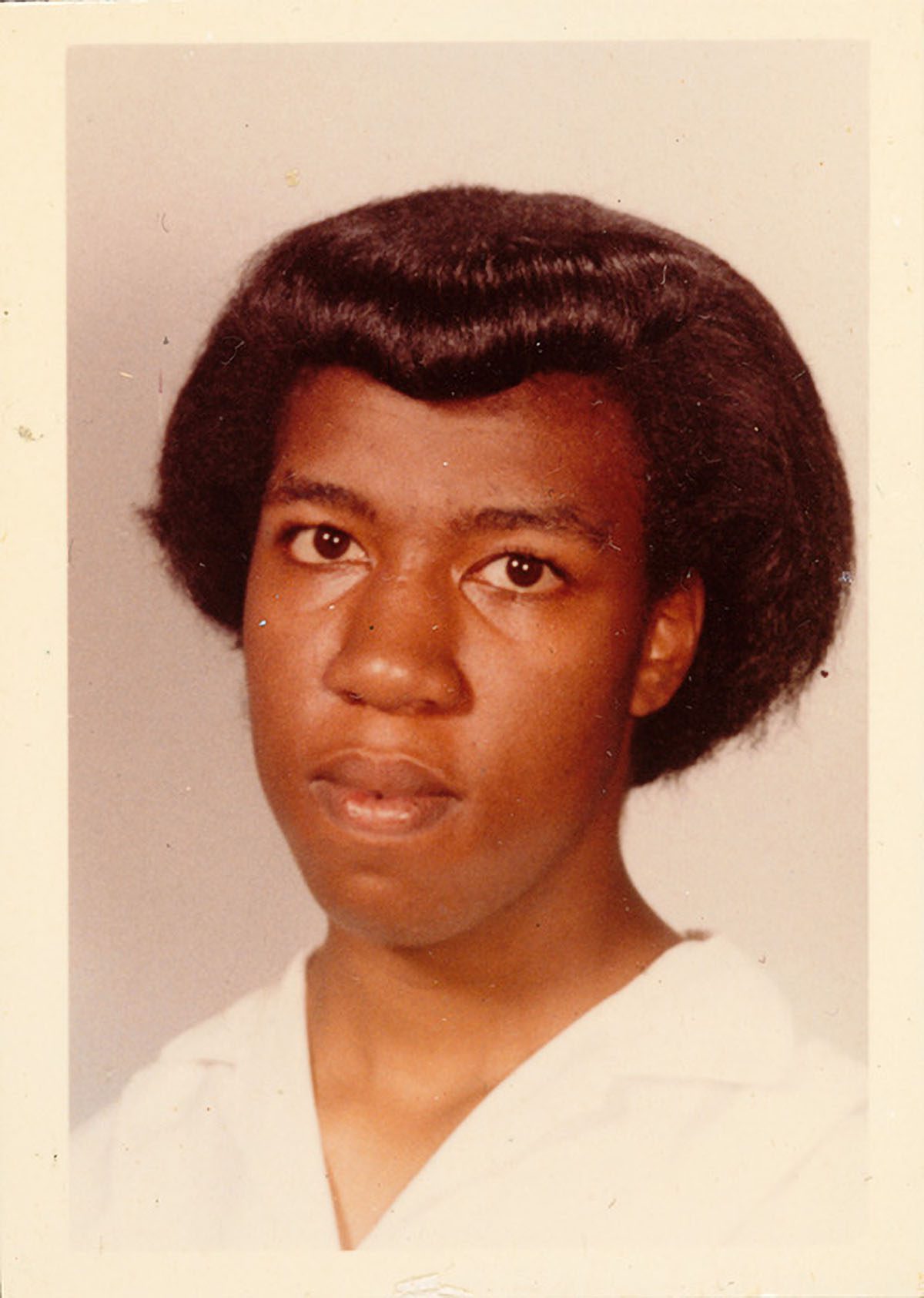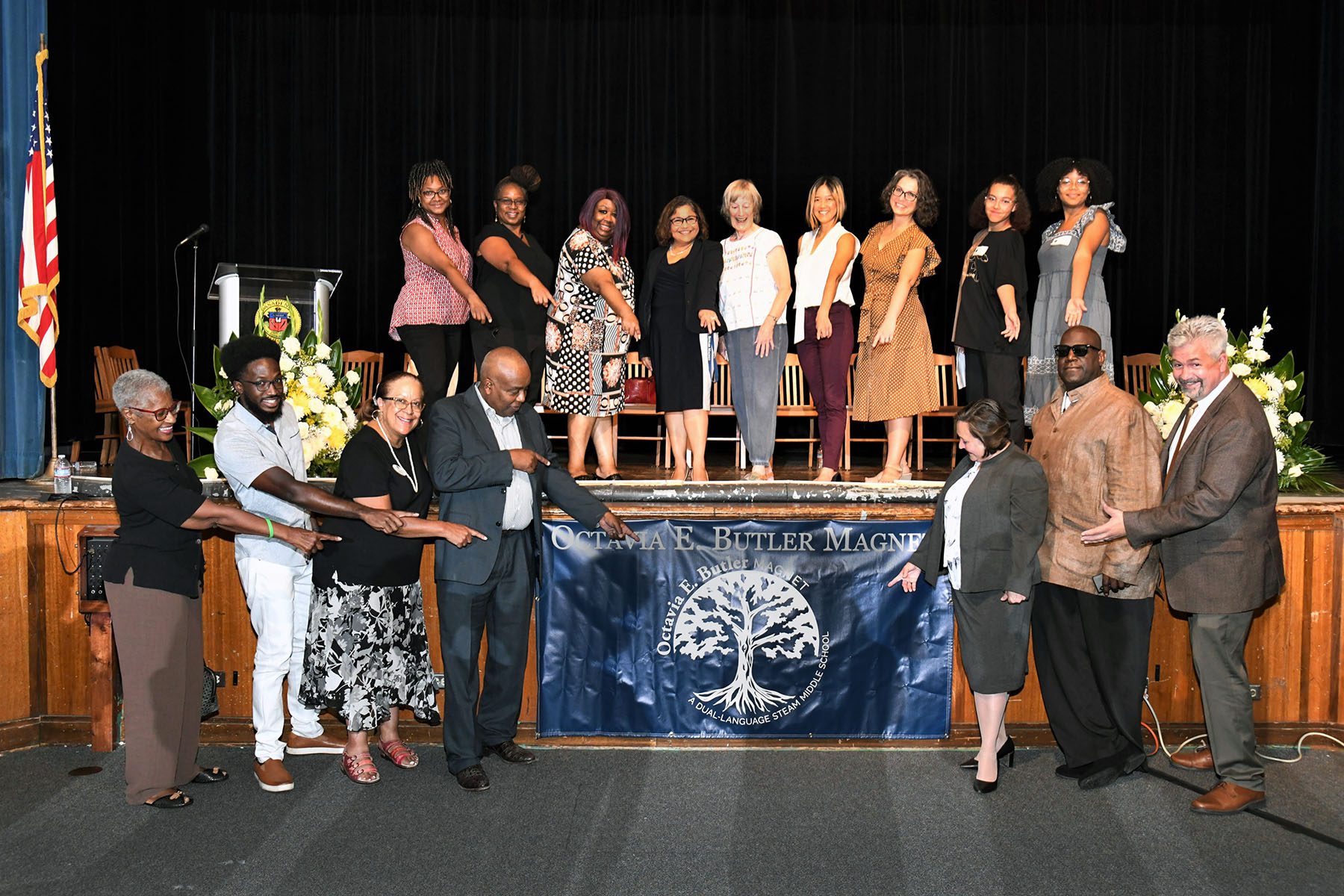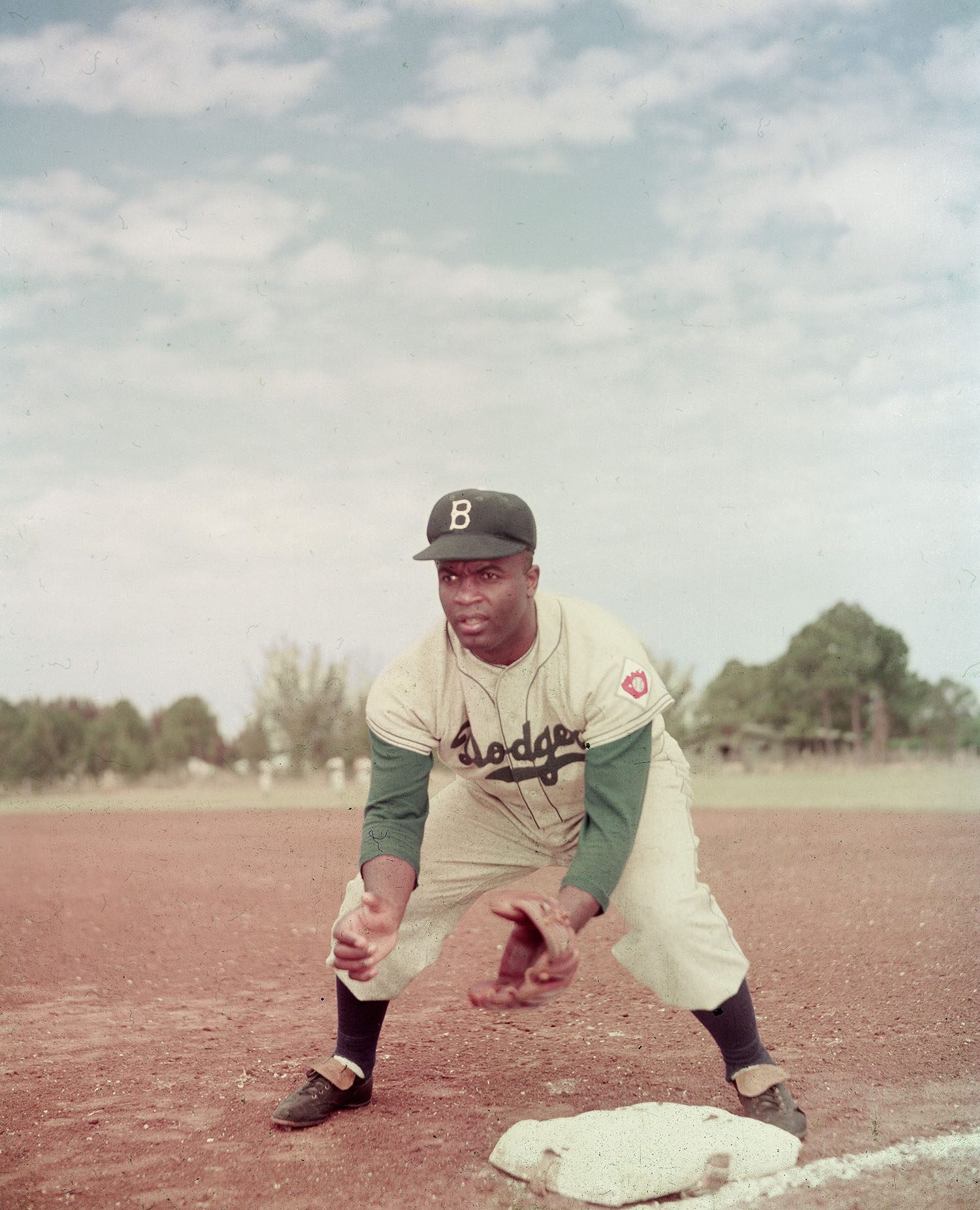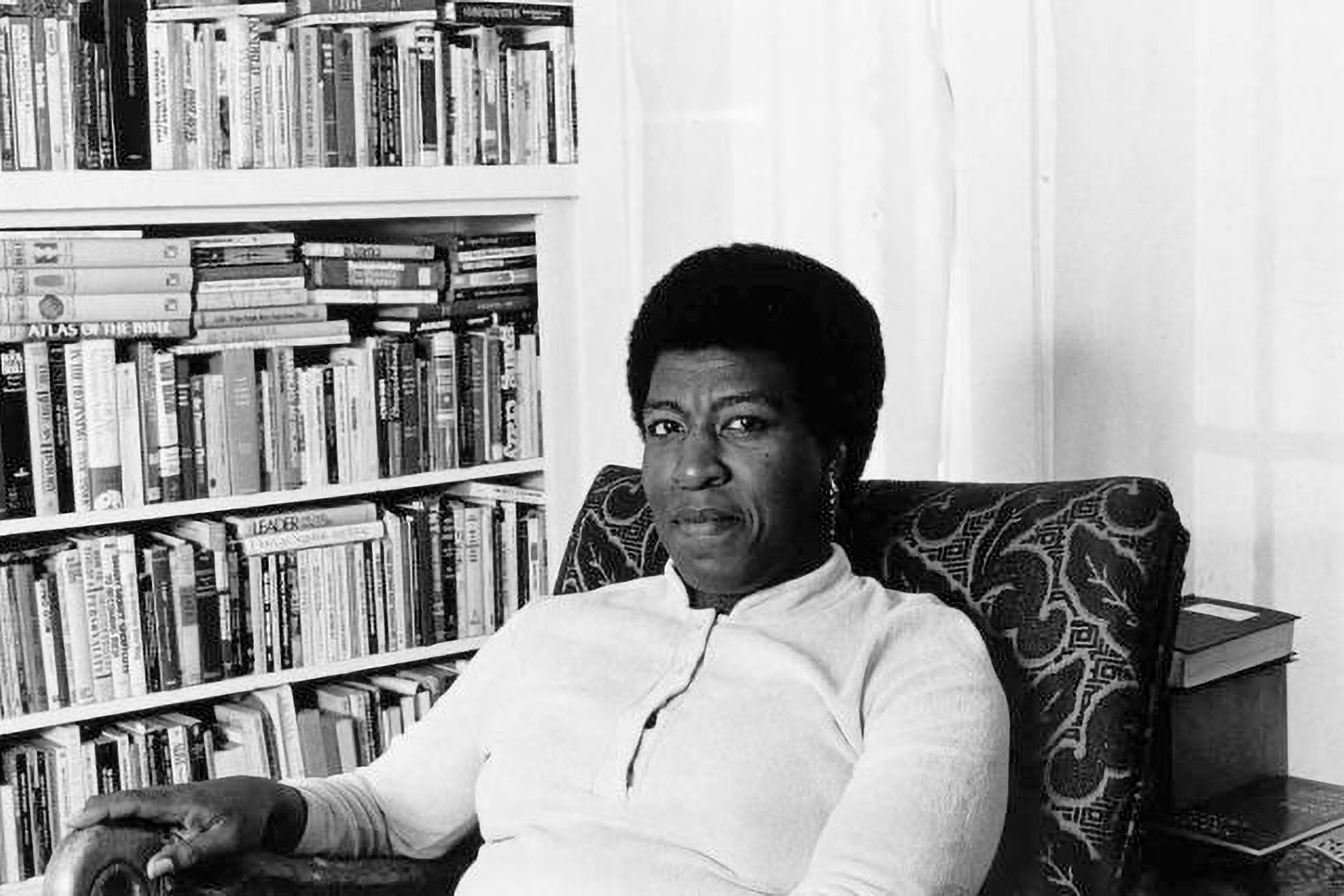When science-fiction writer Octavia Butler was growing up in the 1950s and ’60s, school was a struggle. With undiagnosed dyslexia, she didn’t excel in class. Outside of it, the shy student lacked the social skills of her more gregarious peers. And her height — she grew to be six feet tall — made her even more self-conscious.
“It’s tough to be a loner kid with a dream who’s very tall,” said Tananarive Due, an American Book Award-winning author and UCLA lecturer who teaches Black horror and Afrofuturism, including Butler’s work.
But it was during her painfully insecure middle school years in Pasadena, California, that Butler first demonstrated an aptitude for writing, capturing the attention of teachers who encouraged her to keep at it. Today, one of the schools in which she felt so awkward bears her name.
In September, Washington STEAM Multilingual Academy became Octavia E. Butler Magnet, the only school in the nation named for her. The decision was first made in the spring and comes during the same year an FX television series based on her 1979 novel “Kindred” is set to debut, with a December 13 premiere date on Hulu that will expose her work to a new audience.
“Octavia Butler really exemplified what we wanted our students to get out of our programming,” said Shannon Malone, the school’s former principal who ended her six-year tenure in the spring as Pasadena Unified School District’s principal of the year but now serves as the district’s senior director of transitional kindergarten-grade 12 principals. “If you’re involved in science, that doesn’t mean you become someone who wears a white lab coat and does chemistry. It means that you understand science and its various integration points and how it exists throughout everything that you do in the world. Octavia Butler is a perfect example in that she loved science, but she didn’t become a scientist.”

The renaming of the middle school comes 16 years after Butler’s 2006 death from a reported stroke and a fall at age 58. The name change follows George Floyd’s May 2020 police murder, which had led to a so-called racial reckoning in which corporate brands dropped racist logos, cities and states removed statues built for problematic historical figures and schools changed their names for similar reasons.
The newly named magnet school goes deeper than this national trend. Community members told The 19th they feel a direct connection to their hometown literary hero who embodied the mission of the school, which also counts baseball great Jackie Robinson as an alum. As a STEAM school, the magnet focuses on science, technology, engineering, art, and math. (Conventional STEM schools lack the art component.) Throughout her three decades as a literary artist, Butler exposed readers to evolutionary theory, time travel and environmentalism, among other concepts.
Launching her publishing career in the 1970s in a genre dominated by White men, Butler’s success as a Black woman in the science-fiction realm and the name change in her honor is particularly significant to the girls, women and people of color who make up the school community. Octavia E. Butler Magnet has a student body that’s more than 90 percent youth of color.
“It’s really almost overwhelming to think about how meaningful that would be for Octavia,” said Due, who was Butler’s friend. “She’s had a lot of accolades … but when it comes to something like where you went to junior high school, a place where you had all those combinations of experiences … I think that makes it all the more tremendous that this is happening. And it’s especially meaningful for all those little Black girls who are attending that school, but really all the little girls, all the children of color. Frankly, everyone should take inspiration from Octavia Butler.”
Mary Molnar, a Pasadena native whose daughter is a seventh grader at Butler Magnet, said that many schools in the city don’t reflect the diversity of the residents. Home of the California Institute of Technology (Caltech) and the Rose Bowl, Pasadena borders Los Angeles. It has a population of nearly 136,000 people, 35 percent of whom are Latinx, 18 percent of whom are Asian American, 8 percent of whom are Black, and 8 percent of whom are multiracial. But many of the city’s schools are named for White men such as Andrew Jackson, John Muir, James Madison, Alexander Hamilton, William McKinley and Henry Wadsworth Longfellow.

“The representation is not there,” said Molnar, a Filipina American. “So the fact that someone saw that Octavia Butler’s name would be a better representation of the majority of the folks who live in this community — that she was a woman, that she was an accomplished artist — all of that just comes together and … gives me a sense of pride. It is really powerful that it’s not the name of some historical figure that we have no connection to, and in fact, might have actually done harm to our people.”
Molnar’s daughter, Maxine, also welcomes the name change. She said Butler better represents the school’s focus than former President George Washington, whose name the school used to bear. That Butler attended the middle school and wrote science fiction makes her a more appropriate choice, the seventh grader said.
“I think that the fact that we got to change our name so it represents a woman is really helpful,” Maxine said. “I think that it inspires a lot of students at my school.”
Since plans for a name change were announced, Malone said that she has heard from people of all ages and ethnic backgrounds expressing their support for the decision.
“We still have people who are her contemporaries — grandparents and retired teachers — who went to school with her and just feel like it was such a good move for Pasadena to recognize a daughter of the city who has her credentials and represents the community,” Malone said.
Butler entered the middle grades when Pasadena schools were still racially segregated. In that context, she contended with people underestimating her abilities, said Lynell George, author of “A Handful of Earth, A Handful of Sky: The World of Octavia E. Butler” and a longtime Pasadena resident. “And that fed some of her low self-esteem,” George said. But Butler “was able to find people that would champion her,” including a science teacher who saw potential in her writing.
In 1970, the Pasadena school system became the rare district west of the Mississippi River ordered by a court to desegregate. In the 21st century, the legacy of segregation lingers in the district. Pasadena has more than 40 private schools, with almost a third of students attending these institutions instead of public schools – a proportion that is about three times the national average, according to the school district. Upper-income and White students tend to enroll in Pasadena’s private schools while less privileged students and children of color are overrepresented in public schools.

With Malone as principal, Washington became a highly specialized magnet school, attracting students because of its STEAM program and its multilingual academy.
“We are a school that had a lot of racial isolation in regards to Latino and African-American students, and we wanted to create a more integrated environment for the school,” Malone said. “So we applied for a magnet grant with the purpose of creating very specialized and desired programming that would attract people from around the district as well as families from right within our attendance area who were choosing to go elsewhere for their children’s education.”
Renaming the institution for Butler is another way for the district to draw attention to the sophisticated programming the middle school offers, Malone added. That includes a partnership with the nearby NASA Jet Propulsion Laboratory (JPL), which has sent rovers to Mars and probes into the depths of the solar system. When the middle school held its annual science-fiction writing festival last school year featuring stories, plays, essays and art, a JPL representative put on a one-woman bilingual show for the students about space exploration.
“It really harkens to Octavia Butler’s legacy, the idea of something dramatic or literary but still tying it to the sciences,” Malone said.
Thanks to a previous partnership with NASA, the eighth graders complete an interdisciplinary project each year in which they imagine what it would be like to create a space colony. The students write a constitution for the planet and develop a tourism brochure, all while learning about the atmosphere on the planet and what would be required to live and grow food there. In addition, Caltech hosts outreach events for girls at the school and holds math tutoring for students. The institution also takes part in the magnet’s math academy, allowing students to take high-level calculus and register for the advancement placement exam in the subject.
Before rebranding in Butler’s honor, the school named its library after the author in 2020 because she “lived in libraries,” Malone explained. A mural of the author, painted by artist Roberto Quintana, appears outside the library and includes the many life goals she wrote down for herself in notebooks. Despite having a learning disability and growing up in a low-income household with a widowed mother who worked as a housekeeper, Butler had big dreams for herself. She would go on to win prestigious honors for her work, including a MacArthur Fellowship and Hugo and Nebula awards.
Years after her death, Butler’s dreams continue to be realized. In 2020, her 1993 novel “Parable of the Sower” became a New York Times bestseller, indicative of how strong interest in Butler’s work remains. In addition to the FX adaptation of “Kindred” into a dramatic series, plans are in the works to develop her 1987 novel “Dawn” and 1980 novel “Wild Seed” into television series. And last year, NASA named the landing site of its Perseverance rover “Octavia E. Butler Landing,” an honor George suspects would have delighted the novelist.
Much of the interest in Butler “has to do with how accurate she was about where we would be living in terms of our mindset in the early 2020s,” George said. “And she nailed it with the politics, social uprisings and even that term, ‘Make America Great Again’, which was a political slogan in her book ‘Parable of the Talents.’ Everyone said, ‘She’s a seer and she’s prescient, but she … just paid attention. She was always tuned into the climate crisis and doing research on that. It’s almost as if we’ve caught up with her finally.”
Lists of handwritten affirmations that Butler wrote for herself as an adult, including her hope of becoming a bestselling author, have been featured in museum exhibits, referenced in podcasts and routinely shared on social media. “I will help poor black youngsters broaden their horizons,” Butler wrote. “I will help poor black youngsters go to college.”
- A page of handwritten affirmations that Butler wrote for herself as an adult in which she includes her hope of becoming a bestselling author.
-
A page of handwritten affirmations that Butler wrote for herself as an adult in which she includes her hope of becoming a bestselling author.
(Courtesy of the Octavia E. Butler Estate)
“It feels like a prophecy fulfilled almost,” Due said of the renaming of Butler’s school. “I mean, here she was learning to dream when she was a child attending the school, and now it’s turned into a school that would have been something beyond her dreams.”
Whether or not the students at Octavia E. Butler Magnet excel in the sciences, they will recall their link to her, Due said. “You remember the names of your schools for the rest of your life. All of them will have that forever connection to Octavia Butler.”
As George watched the renaming ceremony held in September, she couldn’t help but to ponder the significance of the name change for the current students.
“I was thinking how powerful it would be as a kid to go to a school that was named after a Black woman who lived in your neighborhood, who achieved so much with so little,” she said. “There’s something so much more powerful in that than having the school named after a president.”
Since Butler overcame tremendous obstacles and lived until fairly recently, her success tells kids that they, too, can achieve, George said.
“There’s something very tangible about that, like, it’s within your realm of possibility,” she said. “I would have loved to have gone to an Octavia E. Butler School.”








